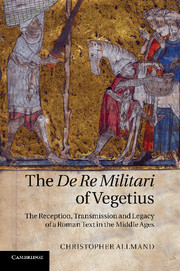 The De Re Militari of Vegetius
The De Re Militari of Vegetius Book contents
- Frontmatter
- Contents
- Figures
- Preface
- Abbreviations
- Introduction
- Part I The medieval reception
- Part II The transmission
- Part III The legacy: the De re militari in medieval military thought and practice
- Appendix I Table of select terms used in translations of the De re militari
- Appendix II List of manuscripts of the De re militari
- Bibliography
- Index
- References
Introduction
Published online by Cambridge University Press: 07 October 2011
- Frontmatter
- Contents
- Figures
- Preface
- Abbreviations
- Introduction
- Part I The medieval reception
- Part II The transmission
- Part III The legacy: the De re militari in medieval military thought and practice
- Appendix I Table of select terms used in translations of the De re militari
- Appendix II List of manuscripts of the De re militari
- Bibliography
- Index
- References
Summary
Little is known about Publius Vegetius Renatus. He was probably born in the mid-fourth century AD, possibly in Spain. Although familiar with the language of the army, it is unlikely that he was ever a soldier or had practical military experience. He was, rather, a member of the bureaucratic élite at the imperial court, bearing the title ‘Flavius’, which identifies him as a public servant, as does the title ‘comes’, found in one branch of the manuscript tradition. It is likely, however, that he had experience of the recruitment, administration and provisioning of armies, for these receive much of his attention. From the Mulomedicina, a work on veterinary medicine which he almost certainly wrote, we learn that he was a much travelled man. From the evidence of the De re militari, it appears that he also appreciated literature, as his references to the works of Virgil and Sallust testify. That he was a Christian (writing some three or four generations after Constantine had issued the Edict of Milan in 312) is witnessed to by his references to the Trinity in the De re militari.
The discussion regarding the date of composition of the De re militari has caused much ink to flow. We cannot be certain about the precise date, as the author does not say for which emperor he was writing, although it must have been between 383 and 450. A recent study of the cultural, literary and historical milieu of, and the language used by Vegetius, has led its author to suggest, that, on the balance of probability, a date in the mid-fifth century was the most likely. Majority opinion, however, still appears to favour a date in the late 380s, and that Vegetius’ ‘patron’ was his fellow Spaniard, Theodosius I ‘the Great’ (379–395), the first emperor to enforce orthodox Christianity and the last to have charge of a united empire. In any event, in whatever form the text was presented to the imperial authority, the origins of the work lay in a memorandum of proposals on military reform which Vegetius presented to the emperor. This was well received, and its author was asked to write more. It was from this effort that what came to be known as the Epitoma rei militaris or, less formally, as the De re militari emerged.
- Type
- Chapter
- Information
- The De Re Militari of VegetiusThe Reception, Transmission and Legacy of a Roman Text in the Middle Ages, pp. 1 - 10Publisher: Cambridge University PressPrint publication year: 2011


